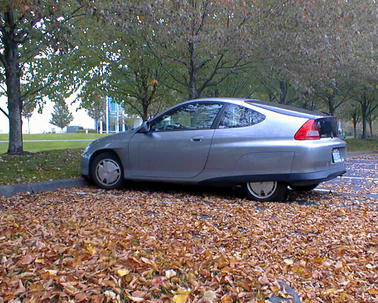
Cost-value comparisons of conventional, alternative-fuel cars
Posted: September 29, 2011
How do hybrid and plug-in hybrid electric vehicles stack up against gasoline-powered cars?
Given currently available technologies, hybrid and plug-in hybrid vehicles with small battery packs win out over conventional gasoline-powered and all-electric automobiles with large battery packs.

An ASU engineer helps determine the most cost-effective and environment-friendly options among conventional gasoline-powered automobiles and newer alternative-fuel vehicles. Photo by: stock.xchng photo
That’s according to recent research by an Arizona State University engineer and colleagues at Carnegie Mellon University and the RAND Corporation. Their results are published this month in the Proceedings of the National Academy of Sciences.
The research team included Mikhail Chester, an assistant professor in the School of Sustainable Engineering and the Built Environment, one of ASU’s Ira A. Fulton Schools of Engineering. He and his partners determined the total costs of travel for each kind of vehicle. In addition to purchase, maintenance, and operation costs, their life-cycle cost valuation includes human health impacts, environmental impacts and oil displacement benefits.
In the average electricity mix, their results show that small battery pack vehicles produce lower total costs than other vehicles. The study includes assessment of life-cycle considerations that include manufacturing, electricity generation, and vehicle operation in numerous counties throughout the United States.
It’s an important finding considering the use of government incentives to encourage consumers to opt for alternative-fuel vehicles in the effort to reduce dependency on oil and reduce polluting emissions. The team’s research results show that the American Recovery and Reinvestment Act of 2009, which provides a tax credit of up to $7,500 for up to 200,000 vehicles, might produce more benefit if directed at hybrids or plug-ins with small battery packs.
“It’s possible that in the future plug-in vehicles with large battery packs might offer the largest benefits at competitive costs if the right factors fall into place, including sufficiently low-cost batteries, high gasoline prices, low emission electricity and long battery life,” Chester says. “But such a future is not certain, and in the near term HEVs and plug-in vehicles with small battery packs provide more emissions benefits and oil displacement benefits per dollar spent.”
More details are available in the Proceedings of the National Academy of Sciences, a related news release and an article on the Greenwire news website.
Bloomberg News
Editor’s Note: Links are included for informational purposes only. Due to varying editorial policies, news publications may remove or change a link for archival purposes at any time without notice.



































